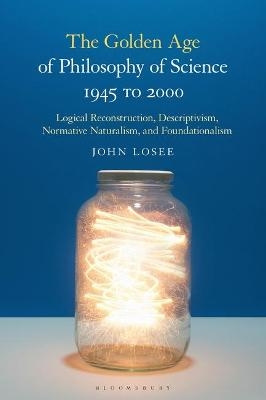
The Golden Age of Philosophy of Science 1945 to 2000
Logical Reconstructionism, Descriptivism, Normative Naturalism, and Foundationalism
Seiten
2018
Bloomsbury Academic (Verlag)
978-1-350-07151-3 (ISBN)
Bloomsbury Academic (Verlag)
978-1-350-07151-3 (ISBN)
This book offers the reader a guide to the major philosophical approaches to science since World War Two. Considering the bases, arguments and conclusions of the four main movements – Logical Reconstructionism, Descriptivism, Normative Naturalism and Foundationalism – John Losee explores how philosophy has both shaped and expanded our understanding of science.
The volume features major figures of twentieth century science, and engages with the work of previous philosophers of science, including Norman Campbell, Rudolf Carnap, Ernest Nagel, Karl Popper, Richard Dawkins, and John Worrall. In particular, The Golden Age of Philosophy of Science, 1945 to 2000 aims to answer the following questions: How should competing philosophies of science be evaluated? Should philosophy of science be a prescriptive discipline? Can philosophy of science achieve normative status without designating trans-historical evaluative principles? And finally, how can understanding the history of science aid us in analyzing the philosophy of science? In answering these questions, this book shows us why we understand science the way we do.
The Golden Age of Philosophy of Science 1945 to 2000 is essential reading for students and researchers working in the history and philosophy of science.
The volume features major figures of twentieth century science, and engages with the work of previous philosophers of science, including Norman Campbell, Rudolf Carnap, Ernest Nagel, Karl Popper, Richard Dawkins, and John Worrall. In particular, The Golden Age of Philosophy of Science, 1945 to 2000 aims to answer the following questions: How should competing philosophies of science be evaluated? Should philosophy of science be a prescriptive discipline? Can philosophy of science achieve normative status without designating trans-historical evaluative principles? And finally, how can understanding the history of science aid us in analyzing the philosophy of science? In answering these questions, this book shows us why we understand science the way we do.
The Golden Age of Philosophy of Science 1945 to 2000 is essential reading for students and researchers working in the history and philosophy of science.
John Losee is Emeritus Professor of Philosophy at Lafayette College, USA.
1. Logical Reconstructionism
2. Orthodoxy under attack
3. Interlude: A Classificatory Matrix
4. Descriptivism
5. Normative Naturalism
6. Foundationalism
7. Descriptivism versus Foundationalism
Index of Names
Index of Subjects
| Erscheinungsdatum | 28.12.2018 |
|---|---|
| Verlagsort | London |
| Sprache | englisch |
| Maße | 156 x 234 mm |
| Gewicht | 635 g |
| Themenwelt | Geisteswissenschaften ► Philosophie ► Allgemeines / Lexika |
| Geisteswissenschaften ► Philosophie ► Geschichte der Philosophie | |
| Geisteswissenschaften ► Philosophie ► Philosophie der Neuzeit | |
| Naturwissenschaften | |
| Sozialwissenschaften | |
| ISBN-10 | 1-350-07151-X / 135007151X |
| ISBN-13 | 978-1-350-07151-3 / 9781350071513 |
| Zustand | Neuware |
| Haben Sie eine Frage zum Produkt? |
Mehr entdecken
aus dem Bereich
aus dem Bereich
die letzten Jahre der Philosophie und der Beginn einer neuen …
Buch | Hardcover (2024)
Klett-Cotta (Verlag)
CHF 39,20
Gesundheitsschutz, Selbstbestimmungsrechte, Rechtspolitik
Buch | Softcover (2024)
Kohlhammer (Verlag)
CHF 54,60
Jenseits von Identität | Ausgezeichnet mit dem Leipziger Buchpreis …
Buch | Softcover (2023)
Ullstein Taschenbuch Verlag
CHF 19,55


